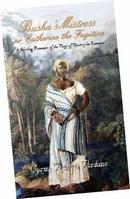
Title: Busha's Mistress Or Catherine the Fugitive
Author: Cyrus Francis Perkins
Edited by: Paul E. Lovejoy, Verene A Shepherd & David V. Trotman
Publisher: Ian Randle Publishers, Kingston. Miami
Reviewed by: Barbara Nelson
The author of this book, Cyrus Francis Perkins, was born in Falmouth, Jamaica, on January 5, 1813, and lived until 1867. His birth was ata time when the slave system was flourishing and only six years after the transatlantic trade in African captives had ceased.
He wrote the book while in Canada from1854-55 and it was first published in Jamaica in 20 installments in the Daily Telegraph and Jamaica Guardian (Kingston) in 1911.
Perkins was white, a planter in his earlier years, and "worked as a missionary among the negro population" in his later years. His position enabled him to have "ample and practical knowledge of the circumstances" that existed in Jamaica at that time. He also understood the language of the slaves:
"Po' me gal," says Mary Ann, "me sorry say me eber drop the wod out a me mouth to tell him say Busha put me dar Bilbo."
"And the way they thought a 'walk-foot backra' in the negro's eye was everything that was mean and pitiful."
"The negroes believe nothing favours the visits of the 'duppy' more than silence, so they always sing when alone in the dark."
In the preface, Perkins says that "the features of slavery under whatever form of government it may exist, are essentially the same: repulsive, degrading and brutalising, to the human mind." This statement is noteworthy as the majority of residents who were of European descent in Jamaica were pro-slavery.
Perkins, in fact, represents a part of white Jamaican society of the early 19th century that was critical of slavery and the conditions that faced people after the abolition of slavery.
The story is set in Trelawny, one of the most important sugar-producing parishes in the island at that time, and gives an important view of existing social conditions at the time. Trelawny was given the name in recognition of then Governor of Jamaica, Sir William Trelawny.
In Busha's Mistress the overseer of Greenside Estate is a cruel white man, Mr. Jackson - the 'Busha' in the story. Young Mr. Vernon comes out from England to work as second bookkeeper on the estate and finds a situation where a coloured young woman, Catherine Brown, is Jackson's 'mistress'and housekeeper.
"The practice by which white men kept enslaved black or coloured women as their 'mistresses' or 'housekeepers' was a well-established one in Caribbean slave systems."
The unequal sexual unions resulted in 'coloured' children, some of whom were eventually freed while others remained enslaved.
Vernon is determined to get to know Miss Brown 'a quadroon of prepossessing appearance with a dignity in her demeanour.' He asks her about the child that she had (with the Busha) and enquires if it was born free. She tells him that "it belong to the property."
She quickly warns him: 'If Busha hear you ask me anything, he will be vex. Bakra-sah on the estates never allowed to talk to negroes.'
Vernon's apartment was a twelve-foot square room with a pine bedstead on which was a mattress - 'a large bag filled with brash from the plantain tree' - covered with two clean oznaburghs.
Crack of the whip
On his first morning on the estate, after breakfast, Vernon soon heard "the loud crack of the whip (which) announced that the daily routine of flogging had commenced." To Vernon's surprise, he noticed that several women were punished by flogging and one who was in an advanced state of pregnancy "was considerately accommodated with a hole which was dug in the ground over which she was stretched."
As time passes, Vernon is greatly disgusted by the system of slavery, especially by the indignity to women and girls who were partially stripped in the public millyard before being flogged, and the punishments that included amputation of limbs and ears. Malignant diseases were prevalent among the unhappy slaves. They, however, realise that Vernon cares for them and the old Baptist leader affirms that Vernon was 'a white man with a black heart.'
But 'Busha' Jackson soon gets into trouble when he almost breaks the rule that the brown girls, (the house girls) are not to lay down and be whipped in the public yard. Further, the secret comes out that he was punishing Mary Ann (a brown girl) because she would not live with him. At this revelation, 'Busha's Mistress', Catherine, is livid and she decides to leave him.
Horrors
The story brings to light many of the horrors, prejudices and peculiarities of the days of slavery: the estate dungeon that was a 'tomb of the living' where slaves who were severely whipped were shackled in a damp, dark, stinking vault; the public sale of slaves where families were torn apart; the 'Workhouse Sales' where negroes who were found without 'their manumission paper' were apprehended, (fitted with an iron collar around the neck and fastened to another negro by a stout iron chain five feet long) and later sold.
Vernon became ill and "visited the Milk River bath, a mineral spring on the south side of the island, celebrated for its medicinal virtues." He is ashamed "that slavery is linked to the British throne" and that it is also linked to his own father's house.
Catherine, meanwhile, went off to England on the ship Clara with one Mrs. Arnold and in doing so, eventually obtained her freedom. She also left her little boy Tommy there to be educated. But in spite of all that had happened, she still loved Mr. Jackson and, on returning to Jamaica, sets out to find him.
Does Catherine find Mr. Jackson? Does her son return to Jamaica? Whatever happened to Mr. Vernon? All these questions are answered in the end.
Busha's Mistress is engaging, absorbing and very informative.

